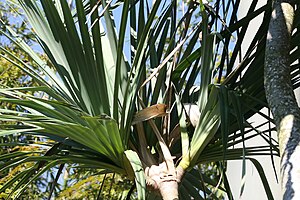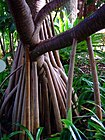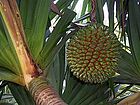Note: This is a project under development. The articles on this wiki are just being initiated and broadly incomplete. You can Help creating new pages.
Pandanus utilis
Pandanus utilis is the common screwpine is a monocot and not a pine. It is native to Madagascar and naturalised in Mauritius.
Contents
- 1 Uses
- 2 Parts Used
- 3 Chemical Composition
- 4 Common names
- 5 Properties
- 6 Habit
- 7 Identification
- 8 List of Ayurvedic medicine in which the herb is used
- 9 Where to get the saplings
- 10 Mode of Propagation
- 11 How to plant/cultivate
- 12 Commonly seen growing in areas
- 13 Photo Gallery
- 14 References
- 15 External Links
Uses
Parts Used
Chemical Composition
Utilis leaves, 19 compounds were obtained, consisting of seven triterpenoids (1-7), five steroids (8-12), four cyclohexenone derivatives (13-16), two benzenoid glycosides (17 and 18), and one lignan (19).[1]
Common names
| Language | Common name |
|---|---|
| Kannada | |
| Hindi | |
| Malayalam | |
| Tamil | |
| Telugu | |
| Marathi | NA |
| Gujarathi | NA |
| Punjabi | NA |
| Kashmiri | NA |
| Sanskrit | |
| English | Bacona |
Properties
Reference: Dravya - Substance, Rasa - Taste, Guna - Qualities, Veerya - Potency, Vipaka - Post-digesion effect, Karma - Pharmacological activity, Prabhava - Therepeutics.
Dravya
Rasa
Guna
Veerya
Vipaka
Karma
Prabhava
Habit
Identification
Leaf
| Kind | Shape | Feature |
|---|---|---|
| Simple | Leaves arranged spirally in 3 series | crowded towards the top of stems, simple, without petiole but with broad clasping base |
Flower
| Type | Size | Color and composition | Stamen | More information |
|---|---|---|---|---|
| Unisexual | Cream white | Male flowers odorous, with 8–12 stamens inserted pseudo-umbellately on slender columnal excrescences 10–15 mm long; female flowers with 3–8-celled ovary crowned by a sessile stigma. |
Fruit
| Type | Size | Mass | Appearance | Seeds | More information |
|---|---|---|---|---|---|
| Simple | Dome-shaped, compressed, angular drupe arranged in a pendulous, long-peduncled | Subglobose syncarp 15–20 cm in diameter | {{{5}}} | {{{6}}} |
Other features
List of Ayurvedic medicine in which the herb is used
Where to get the saplings
Mode of Propagation
How to plant/cultivate
Pandanus utilis can be propagated by seeds, but these are recalcitrant. Pre-soaking of the seeds for 24 hours before sowing is recommended for Pandanus in general.[3]




